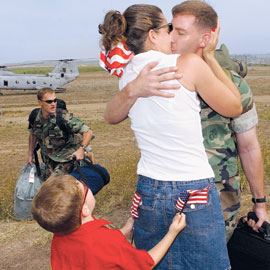 |


|
Autumn 2003 | Volume 26, Number 4 | Faculty | ||||
| Fighting
for
Famıly Parrotts Speak to Returning Soldiers About Keeping the Family Together WHEN THE COMMANDING OFFICER of the 2nd Battalion Marines — now the most decorated battalion in U.S. history — calls from Iraq and asks you to speak to his returning soldiers about how to re-enter life at home, how can you say no?
The Parrotts, authors of such popular books as When Bad Things Happen to Good Marriages, The Love List and Saving Your Marriage Before It Starts, gave a one-day seminar in August at California’s Camp Pendleton for 800 battle-weary Marines who had returned just days earlier from six months in Iraq. Many of the Marines’ spouses were also present, but approximately one-third of the soldiers had not yet reunited with their families or seen their newborn babies. “I can’t remember a time when I’ve felt more moved or felt more sense of purpose when speaking with a group,” Leslie says. “These soldiers were kids, really, many of them younger than the average SPU student.” Les, who ministered to rescue workers and survivors at Ground Zero just after the World Trade Center attacks, told the Marines he helped firefighters cope when they bagged body parts for the makeshift morgue. He told them he listened to recordings of the last cell phone calls received from people trapped in the Twin Towers. The experiences helped him, he said, when he tried to imagine the scenes of horror the Marines had witnessed. Leslie found that the best way to reach the soldiers was to get down to the basics. We reminded them about communication skills, dealing with conflict, restoring passion and experiencing a stable definition of love,” she says. “We also told them about the myths of marriage,” says Les. “Mainly, that when you come back from deployment, everything good will be better, and everything bad will disappear.” An ABC-TV “Good Morning America” crew filmed the day’s events. The talk show is airing segments of the Parrotts’ seminar in Camp Pendleton as it follows up on the families in the months ahead. Though the young soldiers have much to overcome, the Parrotts are hopeful about their re-entry into family life. “These Marines fought for their country,” says Les, “and now they’re fighting for their marriages.” — BY MARGARET D. SMITH |
From the President “What is a college education really worth?” asks President Philip Eaton. With universities under scrutiny today, SPU must reflect about its influence and impact. Closing the Gap A Record-Setting Autumn Creativity Takes Flight |
